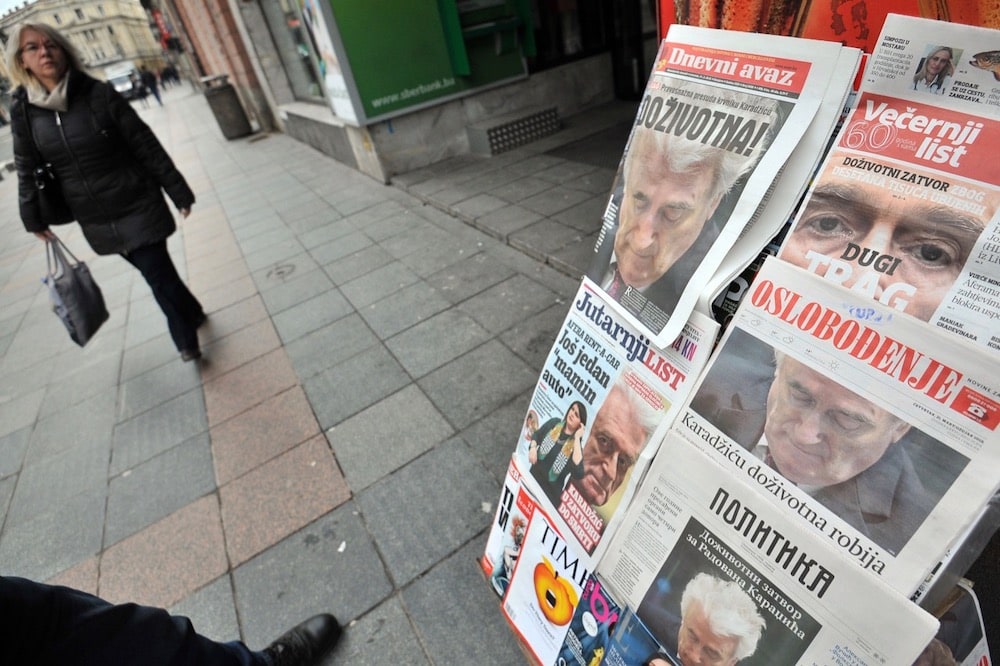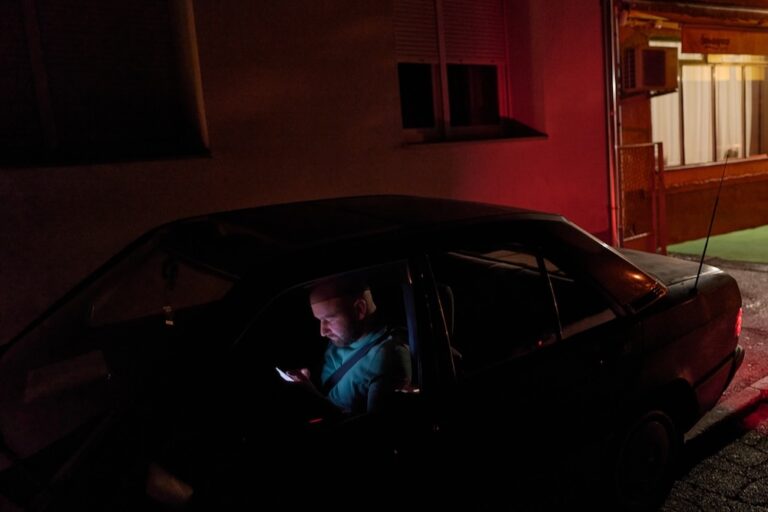Media groups have put forth recommendations on a number of concerning issues, such as the problems plaguing the public broadcast service, the proposed criminalisation of defamation and journalists' safety.
This statement was originally published on seemo.org on 17 March 2023.
Today, the European Broadcasting Union (EBU), the European Federation of Journalists (EFJ) and the South East Europe Media Organisation (SEEMO) called on authorities and individual politicians at all levels in Bosnia-Herzegovina (BiH) to take immediate action to improve the current media situation in the country.
Financial and functional problems of the Bosnian-Herzegovinian public broadcast service (Radiotelevizija Bosne i Hercegovine – BHRT), the proposed criminalisation of defamation, limits on freedom of expression, as well as the alarming numbers of incidents journalists and other media workers face, should be addressed in order to ensure sustainable conditions for media existence and future democratic developments in Bosnia and Herzegovina.
Financial and organisational dysfunctionality of BHRT
According to the European Broadcasting Union (EBU), finding an urgent solution for the funding of BHRT and ensuring their financial sustainability is crucial for the development of public service media in BiH.
The means of collecting fees could be re-defined, but the sanctions in case of non-obedience with the rules should immediately be made more distinct. The question of debts should be solved by a political / governmental / parliamentary decision once and for all.
Secondly, urgent amendments to the Law on the BHRT are needed. Establishing a corporation, which will reduce the costs of the three public service media, is the only way forward for the future of public broadcasting. Depoliticization of the broadcasters is an ultimate prerequisite.
Thirdly, the criteria for the election of the BHRT governing bodies’ members should be made clearer. The criteria should aim at ensuring a better quality of candidates and not only at entities’ representation. Criteria should include proven knowledge of the media, and a necessary period of experience in the relevant field. The number of governing bodies’ members could be increased in order to ensure a good representation of all segments of the society in the body, which could be a combination of national and civil society representatives.
Fourthly, the challenge of broadcasting for Croats in BIH should be solved and a more precise structural division within the Federal RTV established.
Fifthly, BHRT needs a concise strategy. It is already done well, and it will be delivered to governing bodies refusing discussion.
In the European Commission’s Country Report on Bosnia and Herzegovina 2022, additional concerns were raised regarding the problems BHRT is currently dealing with. Unable to pay taxes and contributions, BHRT let workers go.
Additionally, since 2017 (according to BHRT in 2023), the debt of Radio Televizija Republike Srpske (RTRS) towards BHRT (over 37.5 million EUR at the end of 2022) has been subject to lengthy litigation in entity courts.
These issues pose a serious threat to the financial independence and sustainability of the public broadcasting system. Furthermore, state and entity public broadcasters remain exposed to political influence, in particular through politically controlled steering boards. BHRT warns that “the financing and survival of BHRT as a public service at the state level is seriously threatened, and there is no political will to solve it, because the leading political parties are put in charge of entity public services and they have no interest in solving the issue of BHRT”.
According to BHRT, even the courts have started making political, instead of legal, judgments, since two rulings have already been made in favour of RTRS and to the detriment of BHRT, “even though the law on the public RTV system very clearly and precisely defined mutual obligations“.
We are asking the new Council of Ministers to solve the prolonged problems of BHRT.
Criminalisation of defamation and other laws
Reintroducing defamation and insult as criminal offences and expanding criminal offences against the constitutional order, announced earlier by political representatives in the Republic of Srpska, could soon be implemented through the passing of a law under an urgent procedure in the National Assembly of the Republic of Srpska.
According to information we have received, defamation would be criminalised, and citizens and journalists would be punished with fines of up to 100,000 BAM (about 50,000 EUR).
According to the European and International Federations of Journalists (EFJ and IFJ), the threat of new legislation is a very big problem and making defamation a crime would be a direct hindrance to the principles of freedom of the press, by which one should be able to talk freely without fear of litigation or imprisonment. If adopted, the criminalisation of defamation would present a legal framework for punishing journalists with three to five years of imprisonment for expressing their views.
As a result, returning defamation to criminal legislation may lead to abuse of the legal framework to intimidate and silence journalists. It would be a step backwards in an already fragile media freedom environment in Republika Srpska.
In addition, should this proposal be accepted, the country will face two different standards for defamation since the Federation of Bosnia and Herzegovina, the second entity within the State of Bosnia and Herzegovina, will use international standards and recommendations and continue treating cases of defamation under civil law.
More than 20 years ago Bosnia and Herzegovina was the first country in the region to decriminalise defamation across its entire territory and used for years as a positive example for legal changes.
In February this year, representatives of civil society organisations and independent media signed a declaration in Banja Luka opposing the announcements of the impending criminalisation of defamation in the Republic of Srpska.
We also strongly condemn returning defamation to criminal legislation.
Additionally there is a concern that, even if there is no criminal defamation, politicians and public officials will continue to use civil suits to intimidate journalists.
The regulation of data protection and dealing with hate speech are still problematic.
Bosnia and Herzegovina was one of the first countries in region to adopt the Freedom of Access to Information Act in 2000 and 2001. However, the law requires changes. In actual practice, problems persist due to the inconsistent interpretation of the law by different public bodies; many cases are rejected, and non-harmonization with other laws and unwillingness to apply the law are some of the concerns.
The FACE TV case and the situation with CRA-RAK
One of the obvious examples of pressure exerted on media occurred in recent months when a representative of the Communications Regulatory Agency – Regulatorna agencija za komunikacije (CRA-RAK) threatened to close FACE TV. As its founder Senad Hadžifejzović argues: “It is particularly frightening that such threats and pressures were based on completely untrue claims” (about what was said in their program). As there was no protection, FACE TV contacted the constitutional court for help. In February 2023, the CRA fined FACE TV 15,000 BAM. This CRA decision was criticised on 7 February 2023 by the Press Council (Print and Online Media Council) in Bosnia-Herzegovina (Vijeće za štampu i online medije u Bosni i Hercegovini).
There is still a lack of full financial and political independency of the Communications Regulatory Agency. The procedure to appoint its management must be revised, in order to improve its function and secure an independent body. The mandate of the Board expired at the end of 2017 and for the entirety of the 2018-2022 terms a new board was not appointed.
Limited freedom of expression
As stated in the EC ́s Country report 2022, “the country made no progress in addressing Opinion key priority 12 to guarantee freedom of expression and of the media”.
Threats against journalists and intimidation of journalists
A Delegation of the European Union to Bosnia and Herzegovina stated that the European Commission’s latest Country Report for Bosnia and Herzegovina 2022 notes no progress regarding the protection of journalists over the previous year. “There are serious concerns about political pressure, intimidation and threats against journalists. The polarised political climate, constant verbal attacks and nationalist rhetoric have created a hostile environment for media freedom in Bosnia and Herzegovina.” After receiving candidate status in December 2022, Bosnia and Herzegovina was expected to address some reform areas as a matter of urgency. “One of these is to guarantee freedom of expression and of the media, and the protection of journalists, notably by ensuring the appropriate judicial follow-up to cases of threats and violence against journalists and media workers”.
The Board of Directors of the Press and Online Media Council in Bosnia and Herzegovina called on parties to take more seriously intimidation of journalists and threatening messages. They advised that an initiative to declare journalists as “officials”, meaning an attack on a journalist would then be processed as an attack on an official, should be reconsidered at the institutional level. Otherwise, reports of threats do not move forward and hit a dead end.
In 2021, the BH Novinari journalists’ association recorded 70 cases of journalists’ rights being violated (69 in 2020 and 56 in 2019). It is clear that, every year, we have more and more registered cases.
In the same year, 2021m the BIH Ombudsman received 9 complaints (11 in 2020, 18 in 2019).
The Press Council (Print and Online Media Council) in Bosnia and Herzegovina (Vijeće za štampu i online medije u Bosni i Hercegovini) received 619 complaints on online articles and online readers comments in 2021 (915 cases in 2020).
Self-censorship is becoming more prevalent among journalists as result of the growing number of strategic lawsuits against public participation (SLAPPs).
The South East Europe Media Organisation (SEEMO) recorded 93 cases of attacks, threats, or pressures against journalists in BIH in the year 2022. There was, according to SEEMO, a visible increase in the number of online cases against journalists.
Milorad Dodik, President of Republika Srpska in Bosnia and Herzegovina, at a press conference held on 8 March 2023 in Banja Luka, commented inappropriately on journalists’ initiatives against the criminalisation of defamation and the draft changes to the Criminal Code of the Republika Srpska. It is not the first time that Dodik, along with other politicians in Bosnia and Herzegovina, has voiced negative views about journalists, media NGOs and media in the county. Dodik has announced rigorous measures against the NGO sector and associations financed by donor funds.
In Bosnia and Herzegovina, foreign donations allow entities to secure financing independent from local sources that are often connected to political groups or businesspersons who are politically-orientated or even directly linked to some state officials.
On 9 March 2023, the cars of journalist Aleksandar Trifunović, from Buka in Banja Luka, and Nikola Morača from the newspaper EuroBlic and the web portal SrpskaInfo in Banja Luka, were scratched by unknown vandals. Only some days earlier on 24 February 2023, Morača was questioned by the police and his mobile phone was confiscated after he refused to name the source of his information. Morača was questioned at the local police station, in connection with an article he wrote about the rape of an eighteen-year-old girl, in which there is one suspected person. The journalist was asked to reveal who gave him information about the person suspected of rape.
The best example of the severe position of journalists in BIH is revealed in the results of a survey published in 2021, on “INTEGRITY OF JOURNALISM AND TRANSPARENCY OF MEDIA IN BOSNIA AND HERZEGOVINA” ( INTEGRITET NOVINARSTVA I TRANSPARENTNOST MEDIJA U BOSNI I HERCEGOVINI) 66.7% of the journalists answered “yes” when asked if they would leave journalism as a profession if they had the opportunity.
Lack of protection of journalists within the newsrooms
A research report entitled “Internal capacities and needs of the media in the field of protection and safety of journalists in Bosnia and Herzegovina,” conducted by the Bosnia-Herzegovina Journalists’ Association (BHN) in late 2022 and early 2023, showed that most of the media in Bosnia and Herzegovina do not have any regulations protocols related to the protection of journalists within the newsrooms, or on how to handle cases of attacks on journalists and other employees. Many journalists, who have experienced attacks, pressure or threats, have not received any support from their editors.
In line with these findings, we call for the adoption of internal standards, which will provide for the necessary protection of journalists and media workers. Besides the previously discussed improvements in external institutional protection, adequate solutions must be found internally, within the media outlets, as well.



